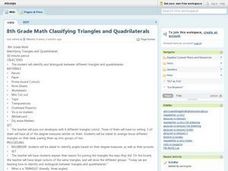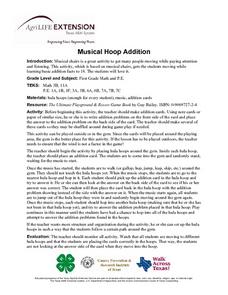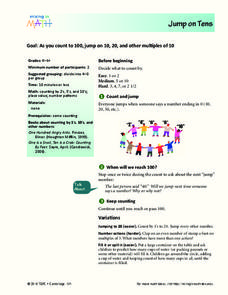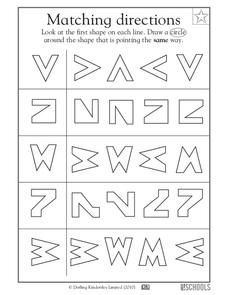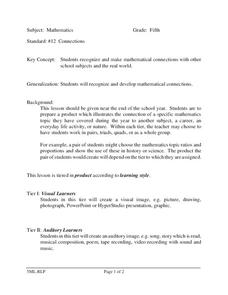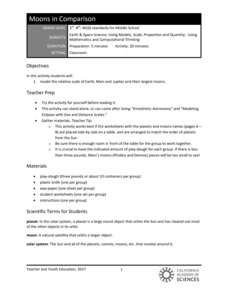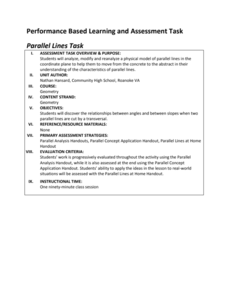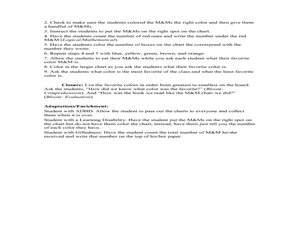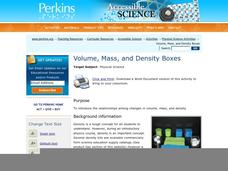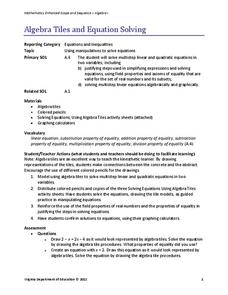Berkshire Museum
Where’s the Water?: Acting Out Science Cycles
Young scientists transform themselves into rivers, oceans, clouds, and drops of water in order to explore the water cycle. After assigning and explaining to students their different roles in the activity, the teacher reads aloud a...
Curated OER
Inequalities and The Order of Operations
Middle and high schoolers investigate how to solve inequalities. The lesson has a good guide for taking pupils through a direct instruction of the concept. You can use counting tiles in order to help kinesthetic learners.
Curated OER
8th Grade Math Classifying Triangles and Quadrilaterals
Eighth graders engage in a lesson that is about classifying polygons with the focus being upon specific triangles and quadrilaterals. They conduct activities using cutouts for kinesthetic learners to help make connections while...
Curated OER
Sharing Marbles Equally
Young elementary-schoolers are constantly reminded to share with others. Use this familiar concept in this equal distribution activity. Scholars choose either 10, 16, or 28 as the number of marbles they have to give out. Then, they...
Curated OER
Expanded Shells
Practice expanded and standard notation in this beach-themed addition activity. You will need to cut out the shell templates, which are in three groups: ones, tens, and hundreds. Learners choose one from each group, then use the...
Curated OER
Interpreting Graphs
Sixth graders interpret linear and nonlinear graphs. They create graphs based on a problem set. Next, they represent quantitive relationships on a graph and write a story related to graphing.
Curated OER
Musical Hoop Addition
Musical chairs is a great activity to get children moving while still paying attention and listening. This activity, which is based on musical chairs, gets students moving while learning basic addition facts. They hop from hoop to hoop...
Curated OER
Jump on Tens
Give the actors in your class a chance to shine as they act out skip-counting. In their roles, they take turns shouting out different number patterns and jumping when reaching the given goals set for each number family. A fun and...
Curated OER
Numeral Dough Mats
Kinesthetic learners will have a great time with numbers as they play with colored dough using these numeral recognition mats. The resource outlines number 0-9, each large enough for a full-page. Print them out and laminate, then use in...
Curated OER
Matching Directions
These shapes are pointing all over the place. Learners examine rows of crazy shapes to find the one pointing in the same direction as the first in the row. Keep in mind, these aren't the shapes your mathematicians are used to. Because...
Curated OER
Brother In The Box
Middle schoolers investigate the concept of finding the area of a parallelogram. The lesson plan uses a story that is told as an illustration to help straighten the confusion associated with the concept. Students could construct...
Curated OER
Connections
Fifth graders create a musical composition, a drawing, or a 3D structure to show how math connects to other subjects. In this math and other subjects lesson plan, 5th graders present their presentations to the class and explain the...
Curated OER
Numbers You Can Count On
Pupils engage in a lesson that is concerned with the concept of recognizing numbers. They use Crayola Coils to imitate a number that is made from a ball. The activity is especially suitable for students who are kinesthetic.
Core Knowledge Foundation
A “Whole” Lot of Fraction Fun!
Young mathematicians are introduced to fractions in a unit that helps them to understand parts of a whole.
Alabama Learning Exchange
Exponents and Division
Create a human fraction to learn about division of exponents. Scholars develop the rule for division of exponents by being part of a human fraction to explore and justify the rule. They also consider zero exponents and negative exponents.
California Academy of Science
Moons in Comparison
Just how big is Earth's moon? With a hands-on simulation, scholars use Play-Doh to model the sizes of the planets Earth, Mars, Jupiter, and their moons. They make predictions as a class, work together to make their models, and discuss...
Curated OER
Dolphins And Penguins
Students participate in an activity that reinforces vertical addition sentences as well as provides facts about penguins. They assess a kinesthetic/visual activity to reinforce the difference between vertical and horizontal addition...
Super Teacher Worksheets
Prime and Composite
Factoring is an essential component in algebra, and this worksheet prepares learners with a quick reference guide and examples. After they find all the factors, they decipher whether the number is prime or composite.
Beyond Benign
Decision Graphic Introduction
E is for economics, environment, and social equity. The fifth installment of a 15-part series has scholars first considering ecological impacts, such as determining how much water it takes to produce a can of soda. They then use decision...
Radford University
Parallel Lines Task
Transform the classroom into a coordinate plane. Scholars walk along parallel lines drawn on a coordinate plane on the classroom floor. They measure angles and slopes and use the results to develop criteria that would make the lines...
Curated OER
Veggie Chop and Data Analysis
First graders chop vegetables into fractions. In this fractions lesson, 1st graders cut vegetables, collect data about favorite vegetables and create a bar graph using the information. Students make inferences about the data and record...
Curated OER
M&M Counting Chart
Students practice classifying objects while utilizing candy. In this sorting lesson, students observe an assortment of M&M's and analyze the candy based on color. Students create a color chart based on the number of different colored...
Perkins School for the Blind
Volume, Mass, and Density Boxes
Mass and density are difficult topics for kids to understand, and even more difficult when you have visual impairments or blindness. Learners will make boxes and fill them with cotton, sand, or crushed paper. They will feel the density...
Virginia Department of Education
Algebra Tiles and Solving Equations
Young mathematicians solve linear equations by drawing models of algebra tiles using colored pencils. To finish, they solve the same equations algebraically and check their answers using a graphing calculator.




